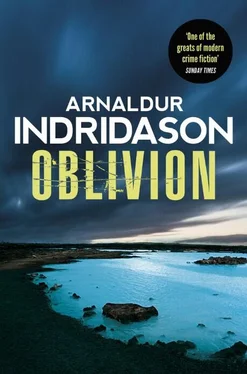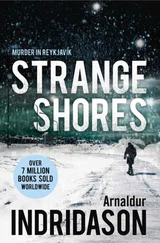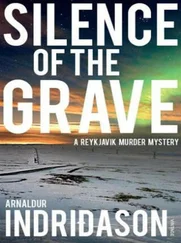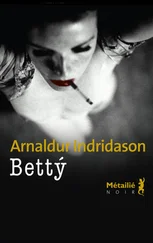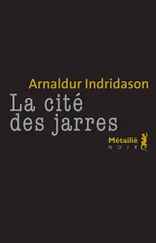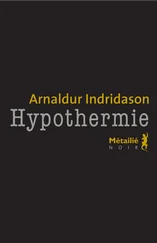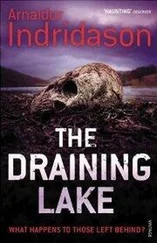‘Did anyone see him?’
‘No. He didn’t think so. After that they hastily reloaded and the plane went on its way.’
‘And what did Kristvin intend to do with this information?’
‘You mean what did we intend to do with it?’
‘Yes, of course, what did you intend to do?’ asked Marion, with a weary roll of the eyes at Erlendur.
‘I asked him to snap a few pics next time, lent him a camera and all, but the weeks went by and nothing happened. Then I lost my job.’
‘Didn’t you tell your editor about this?’
‘Sure,’ said Rúdólf. ‘I wanted to go down to the base, take photos in the hangar and talk to the guys there, but we were refused permission and there wasn’t much interest in the story at the paper. The bunch of reactionaries who own it didn’t want to piss off the Yanks or something. The big papers here are more about burying news than digging it up.’ He paused for effect.
‘Did it happen again?’
‘No, or at least not that Krissi told me. He gave back the camera. Said he couldn’t risk lugging it around at work. We stopped talking after I broke up with Nanna. It was over between us. All of us.’
‘Do you remember what the airline was called?’
‘Yes, it was... hang on... it ended in “trans” something, “transfer”, or...’
‘Could it have been Northern Cargo Transport?’
‘Hey, that’s it,’ said Rúdólf. ‘Northern Cargo Transport. Krissi found that out. He also found out that the plane was in transit from Europe to South America. He didn’t know where exactly but of course there’s all kinds of conflicts there.’
‘I don’t follow,’ said Marion. ‘What do you mean?’
‘They were obviously shipping arms.’
‘So?’
‘Handled by a civilian operator. Northern Cargo Transport.’
‘So?’
‘So why? Why aren’t the Yanks using their own Hercules transports? Tell me that.’
‘Do you think Kristvin might have found out why?’ asked Marion.
‘Dunno. But it’s entirely possible.’
Later that day a dispatch marked ‘Confidential’ arrived from Fleet Air Command. It was their response to the reiterated letter rogatory that had been issued by the state prosecutor’s office and police commissioner to request all necessary access to the military base for an investigation into the death of an Icelandic citizen. The letter had stated that there were grounds for believing that the man had been murdered on the naval air station, and that the Defense Force’s assistance with the investigation of the incident would be not only welcome but essential. The inquiry’s findings were briefly outlined to explain how it had come to focus on Kristvin’s work on the base, more specifically in Hangar 885.
Fleet Air Command’s response stressed that, since no direct connection to Defense Force activities had yet emerged from the investigation, the military authorities saw no reason at the present time to cooperate with the Icelandic police or grant them access to restricted areas. This applied particularly to Hangar 885. It was pointed out that the naval installation was US territory and that, if the Icelandic police wished to question American nationals within the military zone, they would be required to submit a special application to the commander’s office in each instance, and that all interviews would have to be conducted in the presence of the Defense Force attorney. However, since the Icelandic police’s case was at present based on no more than conjecture, they could not expect further cooperation from the Defense Force at this time.
The woman bore all the signs of a tough life. From her hands with their swollen knuckles and fingers twisted into the palms it was evident that she was far gone with osteoarthritis. Her small eyes peered colourless from a face scored with wrinkles. Her skin was dry and withered, her lips sunken, and when she spoke her words were accompanied by a whistling through the gaps in her teeth. Her hair was a straggling grey mess. Erlendur had come across her name in the police reports from 1953. At the time she had been living in Camp Knox, struggling to bring up five children as a single mother. She was about seventy but looked ninety.
She lived on Brædraborgarstígur in the west of town. Erlendur had rung her doorbell twice before he caught sight of a bent figure shuffling towards him, carrying a green net of groceries from the local shop and a shabby handbag. She was on her way home from work. As she came closer he noticed that she was a little lame and wore a threadbare coat and a headscarf knotted under her chin. On her feet she had brown winter boots with woollen socks sticking over the tops.
‘Who are you after?’ she asked when she reached the door and began scrabbling in her handbag for her keys. Her voice was hoarse and tetchy, as if she didn’t care for men hanging around on her doorstep.
‘Baldvina,’ said Erlendur. ‘This is the right house, isn’t it?’
‘My name’s Baldvina,’ said the woman, surprised. ‘Is it me you’re looking for?’
‘Yes, I suppose so.’
‘Well, I never. What do you want?’
‘I’d like a quick word, if you wouldn’t mind.’
‘What about?’
‘You used to live in Camp Knox, didn’t you?’
‘Camp Knox? Why do you want to know that?’ said the woman. She had her keys in her hand and was about to open the door but changed her mind. ‘What’s it got to do with you?’ she added gruffly.
‘I wanted to know if you could help me with something,’ Erlendur said, noting how her guard had gone up at the mention of Camp Knox. ‘I’m looking into the case of someone who went missing near there a long time ago.’
‘What’s that to do with me?’ asked the woman. ‘Who are you?’
‘My name’s Erlendur. You spoke to the police at the time in connection with the missing girl. Remember?’
‘The girl?’
‘Yes, she was called Dagbjört.’
‘Oh, her, yes. I remember. What about her?’
‘Could I possibly have a word with you about the incident? I promise it won’t take long.’
‘No, I can’t help you, I’m afraid,’ said the woman, opening the door. ‘Just clear off, will you, and leave me alone?’
‘People said she had a boyfriend in the camp. Do you remember?’
‘They thought he’d killed her, didn’t they? Easy to blame the camp people for everything. Buried under the floor of his hut, I expect.’
‘I hadn’t heard that,’ said Erlendur. ‘Was... is that what you’ve heard?’
‘They built the swimming pool where the camp used to be. Expect she’s buried under there now.’
Erlendur couldn’t tell if she was making fun of him.
‘Do you know who her boyfriend was?’ he asked, hastily jamming his foot in the door as she tried to close it on him.
‘Leave me alone, mister,’ said Baldvina. ‘I don’t want to talk to you. Bugger off.’
‘Her father died the other day,’ said Erlendur. ‘And her mother passed away some time ago. They never did find out what happened to their daughter. But I don’t think they ever really stopped hoping she’d come back one day.’
He pulled out his foot and the door closed. A few seconds passed, then he heard the lock rattling and the woman opened the door again and peered at him.
‘What did you say your name was?’
‘Erlendur.’
She continued to eye him.
‘What business is it of yours?’
‘The girl’s aunt hasn’t quite given up hope of finding out what happened. She asked me to do some digging around for her.’
The woman was still sizing up the stranger, with suspicious, grey eyes.
‘All right,’ she said at last and began to hobble up the old wooden staircase. Erlendur slipped inside and tried to lighten her load by taking the shopping bag but she wouldn’t hear of it. He caught some muttered comment about thieving scum. He followed her upstairs to the landing where she laid down the bag, put her key in the lock and opened the door.
Читать дальше
